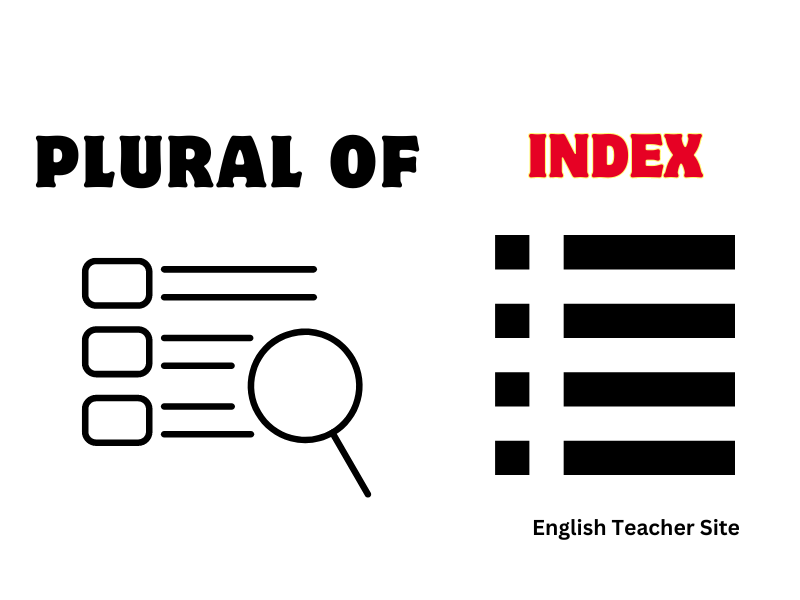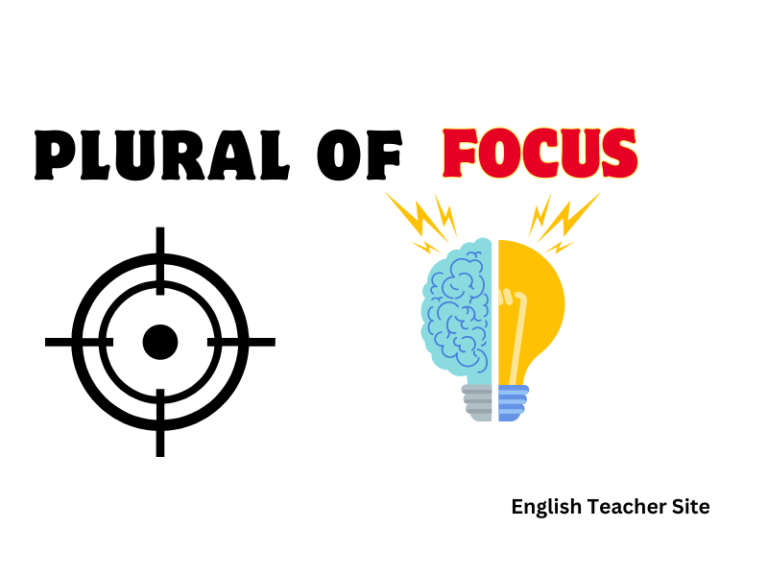What’s the Plural of Index: Understanding Singular and Plural Nouns

- “Index” can be pluralized as “indexes” or “indices” depending on context.
- “Indexes” is commonly used for lists in books, while “indices” in mathematical contexts.
- Both plural forms are valid and reflect the diversity of English noun plurals.
The word “index” has more than one acceptable plural form, yielding to two main variants: “indexes” and “indices.” The selection between these forms often hinges on context and tradition. “Indexes” is commonly used in reference to alphabetical lists in books and databases, while “indices” is preferred in mathematical and technical contexts to describe multiple sets of numerical figures or indications.
What’s the Plural of “Index”?
When discussing the term “index”, one may encounter two commonly accepted plural forms: indexes and indices. Both plurals are correct, but their usage often depends on context.
Regular Plural Form: Indexes
Indexes is the more commonly used plural form in everyday English, particularly in American English. It aligns with the standard rule of adding “-es” to nouns ending in -x.
- Example in a sentence:
- Most libraries have catalogs with multiple indexes to help find books.
| Singular | Plural |
|---|---|
| index | indexes |
Latin Plural Form: Indices
Indices adheres to the original Latin pluralization of the word. This form is predominantly used in mathematical and technical contexts.
- Example in a sentence:
- In calculus, one often deals with multiple indices when working with tensors.
| Singular | Plural |
|---|---|
| index | indices |
Contextual Usage:
- Mathematics and Technical Fields: Indices
- The plural of “index” in mathematical and technical language is often “indices”, reflecting its Latin roots.
- General Use: Indexes
- In general prose and conversation, “indexes” is the preferred plural form.
“Indices” or “Indexes”: Which is Correct?
In formal and technical contexts, particularly in fields such as mathematics or sciences, “indices” is generally preferred. This plural form adheres to the original Latin. For example, mathematical texts typically reference multiple indexes of equations as “indices.”
In more general and non-technical contexts, “indexes” is widely accepted and often used. Publications and literature unrelated to scientific or technical content typically employ this form.
| Context | Preferred Plural |
|---|---|
| Formal or Technical | Indices |
| General or Non-Technical | Indexes |
Language experts mention that “indices” can be used when referring to databases or referencing systems, while “indexes” suits applications such as library catalogs or book contents.
“Indices” commonly references:
- Mathematical or scientific measurements
- Database lookup arrays
- Statistical series within financial markets
“Indexes” is often used for:
- Tables of contents in books
- Search engine listings
- Periodical directories
Defining “Index” – What Does it Mean?
An index is a systematic arrangement of materials, often ordered alphabetically, serving as a guide or point of reference. It’s a tool prevalent in books, databases, and search engines to facilitate the retrieval of information. The term originates from Latin, literally meaning “to point out” or “to indicate.”
Forms of Index:
- Book Index: A list of words or phrases found at the end of books, helping readers locate information.
- Database Index: Structures that improve database query speed by minimizing the number of disk accesses.
- Search Engine Index: A collection of information about websites, enabling search engines to return relevant results quickly.
Indexes are essential in an array of fields, including academics, technology, and finance. They allow users to quickly access desired information without having to peruse extensive amounts of material.
Characteristics of an Index:
| Aspect | Description |
|---|---|
| Function | Aids in finding information |
| Arrangement | Typically alphabetical |
| Accessibility | User-friendly and efficient retrieval |
Indexes are not to be confused with indices, which can also refer to mathematical or economic contexts. In mathematical terms, indices are exponents, while in financial markets, they represent the performance measurement of a section of shares or stocks.
Index in Technology:
- Web Index: Used by search engines like Google to rank and locate web pages.
- Database Index: Often invisible to the end-user, but critical for performance.
Irregular Nouns: -ex/-ix and -ces/-xes Endings
Plurals for -ex/-ix Endings
Nouns ending in -ex or -ix typically replace these endings with -ices or -xes when forming the plural. The following table illustrates some common examples:
| Singular | Plural |
|---|---|
| Index | Indices |
| Matrix | Matrices |
| Vertex | Vertices |
| Appendix | Appendices |
However, it’s important to note that some words can also take on a more regular plural form by merely adding -es or changing to -x. This alternative often coexists with the more irregular form:
| Singular | Plural (Alternative) |
|---|---|
| Index | Indexes |
| Matrix | Matrixes |
Plurals for -ce/-xe Endings
Now, let’s consider words ending in -ce and -xe. Many of these nouns form their plural by simply adding an -s. Here are a few examples, shown with both their singular and plural forms:
- Piece becomes Pieces.
- Price changes to Prices.
In contrast, some nouns require a different approach, adding -es for plurals:
- Box transforms into Boxes.
- Fox turns into Foxes.
In most instances, the addition of -s or -es will suffice, but vigilance is key as exceptions do exist.
Examples of “Index” Used in Context
In finance, analysts might say:
- The Dow Jones Industrial Average is one of the most followed equity indices.
- Investors keep an eye on stock market indexes to gauge market movements.
In academia, particularly in the sciences, researchers may use:
- This study compares several different methods for calculating refractive indices.
- The report lists the chemical properties of materials in its indices for easy reference.
Here, two tables are presented to provide clarity on the use of “index” in different contexts:
| Singular | Plural (Technical) | Plural (General) | Example Sentence |
|---|---|---|---|
| index | indices | indexes | The journal has a comprehensive set of indices. |
| You can locate the chapter names in the book’s indexes. |
| Context | When to Use “Indices” | When to Use “Indexes” |
|---|---|---|
| Academic Papers | Common | Less Common |
| Stock Markets | Less Common | Common |
| Literary Works | – | Common |
Librarians may discuss how:
- Indices in old manuscripts require meticulous curation.
- Esteemed libraries host catalogs with numerous author indexes.
In technology and database management, IT professionals often encounter:
- Database systems have complex indices designed to speed up query times.
- Software documentation includes indexes for functions and classes.
Examples of “Indices/Indexes” Used in Context
Below are examples displaying how each term can be employed in different scenarios.
Academic and Technical Fields:
- In mathematics, the plural form “indices” is commonly used to refer to multiple exponents or locators in a mathematical set or sequence.
Singular Plural The index of a series The indices of a series An equation’s index Equations with multiple indices - In finance, “indices” is often used to talk about multiple stock market indicators.
Singular Plural The stock index Stock market indices The consumer price index Consumer price indices
Publishing and General Use:
- In publishing or when referring to book indexes or databases, both “indexes” and “indices” are correct and interchangeable.
- A database might update its indexes weekly.
- Many reference books include detailed indexes at the end.
Books with an index Books with multiple indexes A dictionary’s list of words Dictionaries with thorough indexes
Computer Science:
- In the field of computer science, specifically when discussing arrays or lists in programming, “indexes” is preferred in casual contexts, but “indices” can also appear.
Singular Plural The array index Array indexes The list index Lists with multiple indexes
Synonyms for “Index”
Here are some common synonyms for “index”:
- Catalog: Often used in the context of libraries or collections, implying a systematic list of items.
- List: A general term for any sequence of items, often used interchangeably with “index.”
- Register: Implies a record or a list, usually official or formal in nature.
- Directory: A listing, typically of names and addresses, such as a telephone directory.
- Indicator: Suggests a measure or a sign that indicates the state or level of something.
Usage Contexts
Different synonyms of “index” are preferable depending on the specific use case or field.
| Context | Preferred Synonym |
|---|---|
| Libraries | Catalog |
| Collections | Register |
| Technical Data | List |
| Contact Details | Directory |
| Measurements | Indicator |
Associations and Connotations
The selection of a synonym for “index” can subtly alter the connotation of the message. For instance, “catalog” might imply extensive organization, suited for large collections or databases.
| Synonym | Association |
|---|---|
| Catalog | Comprehensive |
| List | Sequential |
| Register | Authoritative |
| Directory | Locational |
| Indicator | Quantitative |
Origin of the Word “Index”
Key Developments of the Term “Index”:
- Medieval Era: Initial scholarly usage to refer to alphabetized lists of subjects.
- Renaissance: Expanded use to reference tables of contents and pointers to knowledge in books.
| Era | Use of “Index” |
|---|---|
| Medieval | Alphabetized lists to organize information |
| Renaissance | Tables of contents in books; navigating scholarly tomes |
During the Renaissance, the printing press popularized books, and the index became an invaluable feature for navigation within texts. It was a period marked by a surge in documentation, amplifying the need for organized referencing systems.
Later Developments:
- 17th and 18th Centuries: Became more systematic, reflecting the Enlightenment’s emphasis on order.
Modern Usage:
“Index” is now ubiquitously used in a variety of contexts where classification and referencing are crucial. For example, indexes in mutual funds and stock markets are invaluable for investors to track market movements and trends.
| Context | Use of “Index” |
|---|---|
| Libraries and Academia | Organizing and finding information within texts |
| Financial Markets | Reflecting the performance of specific stock market segments |
Reflecting its rootedness in traditions of organization and clarity, “index” has evolved in meaning but retains its core function of pointing out, indicating, and referencing.
Sources
My name is Khamis Maiouf. I am the creator of the English Teacher Site, dedicated to providing valuable resources and insights for students around the world. With a passion for education and a commitment to helping students enhance their skills, I aim to make English teaching more effective and enjoyable for both educators and students.






